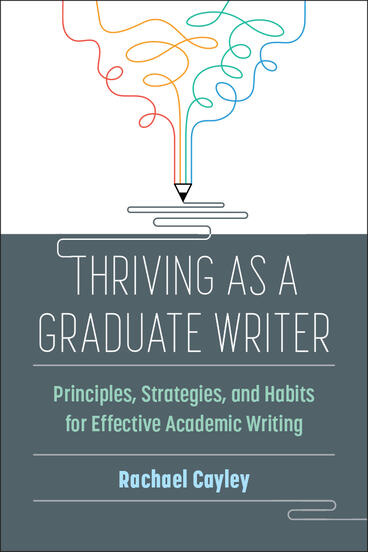August Writing Roundup
This Month in Review

Happy end of August! For many of us, the month of August marks the beginning of the academic year and the bustle of campus life. The start of the school year always feels like a chance for a new beginning. It is an invitation to do something different or better this year. Whether it is setting new research goals, implementing innovative teaching methods, or strengthening connections with your academic community, this time of year represents an opportunity for growth and improvement.
New goals and opportunities necessitate planning and strategizing about how to incorporate them into our lives. With that in mind, here are a few previous posts to help you organize yourself to achieve your writing goals this year:
Achievable Schedule Planning and Why It Matters
Habits for More Productive and Less Stressful Writing
Planning Your Writing Like You Plan Your Syllabus
And now that you’ve expertly planned your writing life, here are some of my favorite media I’ve consumed over the past month on writing, productivity, and managing all-the-things. Some of this content is new, some of it is old, but all of it has kernels of wisdom for busy academics.
1. Here are the Publish Not Perish posts from the past month, in case you missed any:
Office Hours: Writing Groups and Chapter Word Counts
Demystifying Grant Writing for Academics
Navigating Department Politics as a New Faculty Member
My Top Tips for New Faculty Members
From Inbox Overwhelm to Inbox Zen
2. Substack, the platform that hosts Publish Not Perish, has seen an increase in the number of academics launching newsletters in the last year or so. Many of these writers are looking for opportunities to workshop their ideas or write for a larger public audience. This month, I wrote about Academic vs. Public Writing, but I will be posting more about writing for broader audiences soon. In the meantime, I suggest checking out jordie daviespost about (academic) newsletters that she recommends—many of which reflect her interests in Black feminism, navigating the academy, and anti-racism.
3. Dr. Kate Henry tackled the concept of discipline in her newsletter this month. The first post looks at discipline as a cultural discourse, while the second considers discipline through a self-care lens. While recognizing the valid reasons for seeking discipline, Dr. Henry expresses skepticism about its association with productivity and personal development. She brings up three concerns about discipline. First, she worries that discipline might lead to self-denial and the postponement of physical needs. Second, she raises concerns about negative self-talk and self-perception when rules aren't followed consistently. Finally, she emphasizes that standard success frameworks can be exclusionary, ignoring the diverse circumstances that people face. A holistic view of productivity should be tailored to individual goals rather than conforming to a culture of perfectionism.

Personally, the word discipline has always had a somewhat negative connotation for me, as I see it as something rigid, inflexible, and impossible to achieve at all times. Discipline is easy to fail at. Someone once told me in graduate school that dissertation writing was not about discipline but about determination. That spoke to me because determination conjured up images of falling but getting back up and trying again, which mirrored my experience better than discipline could.
4. Speaking of productivity and it’s discontents, here’s a great NPR interview with Devon Price, Ph.D., who just wrote the book Laziness Does Not Exist. In the interview and, presumably, the book, Price challenges the societal idea that being productive all the time is a natural state of being. Animals, for example, don’t have to be productive to justify their right to exist, and neither do we.

As the article summarizes,
Price says the idea of laziness has been effectively and expertly wielded to make people feel unproductive and unworthy. He calls it a lie, and a trap that makes us believe there's always more we could be doing — at work, in our relationships, at home — and that worth is productivity. Instead of viewing "laziness" as a deficit or something we need to fix or overcome with caffeine or longer work hours, Price says to think of laziness as a sign you probably need a break instead.
It’s an interesting read!
5. I’m currently reading Thriving as a Graduate Writer: Principles, Strategies, and Habits for Effective Academic Writing by Rachael Cayley, and it’s really fantastic so far! While it is aimed at graduate students, I believe other academic writers will find it useful as well. The book's insights and tips range from sentence-level construction to the habits and mindsets that help writers complete their projects. It is a combination of Elements of Style and Write No Matter What, both of which are excellent resources.
Cayley demonstrates in the second chapter that there are three distinct stages of the writing process that new writers should be aware of: 1) using writing to clarify thinking, i.e., brainstorming and flow writing to work through ideas; 2) writing as revision, i.e., further clarifying and arranging ideas into a logical flow; and 3) writing as reader awareness, i.e., revising with specific readers in mind. This is a really helpful breakdown, because many graduate student writers believe that their writing is not good if it is not perfect when they first put pen to paper. Cayley articulates what each of these stages of writing entails, which may help nervous writers better understand the process and go easier on themselves. I’d recommend the book even for more seasoned academics because most of us never had formal writing training.



Thanks so much for the shout out, Jenn! Feels great to see the academic community thriving on substack.
Wow I love these round ups every month! I always miss some of your posts (though I have no idea how - I have notifications turned on?!) and I always love your recommendations for other resources! Thank you.